PATHWAY CHOICES

KEY STAGE 4 This booklet has been designed to help you choose subjects which you will study in Years 10 and 11. So far you have been studying a wide range of subjects and now you will have to think carefully about these, so that you can choose a smaller number to study in greater depth over the next two years. All students will study the following core subjects for 16 out of 25 of their timetabled lessons per week. Core Curriculum: English (5 periods) Mathematics & Statistics (5 periods) Science (5 periods) Physical Education (1 period) Everyone will then choose three option subjects (three periods each, nine periods per week in total). These options may be guided to suit your ability. What subject should you choose? Good reasons for choosing a subject include: you’re good at it, it will help you in your career you are keen on, or simply that you enjoy it. 1 Bad reasons to choose a subject include: Your friend is doing it or you think it will be easy - students who think a subject will be easy are often mistaken. If you have high Key Stage 2 data from your Year 6 SATs, you will be guided to choose subjects from Pillar 1. (see page 4) Above all, it is essential that you try to ensure that your education remains broadbased and balanced. In addition to the information included in this booklet, you can ask advice from your subject teacher, form tutor, your life skills teacher, your Head of Year. You will complete your options choices using Microsoft Forms Online. Please note: You will be making four choices, in order of preference. You will be allocated three out of your four choices. Please ensure you select four options subjects that you feel strongly about studying. Potential subject changes: Whilst the courses that are offered in this option booklet are what we believe students will undertake, there can be factors that may cause this to change. For example, a course that we believed was available could be removed, or new courses may be approved that we believe suit students better. It could become apparent that a course is not performing as intended and therefore, we may take the view that a change is in the best interests of the students. We will always endeavour to communicate clearly with students and parents in this situation.
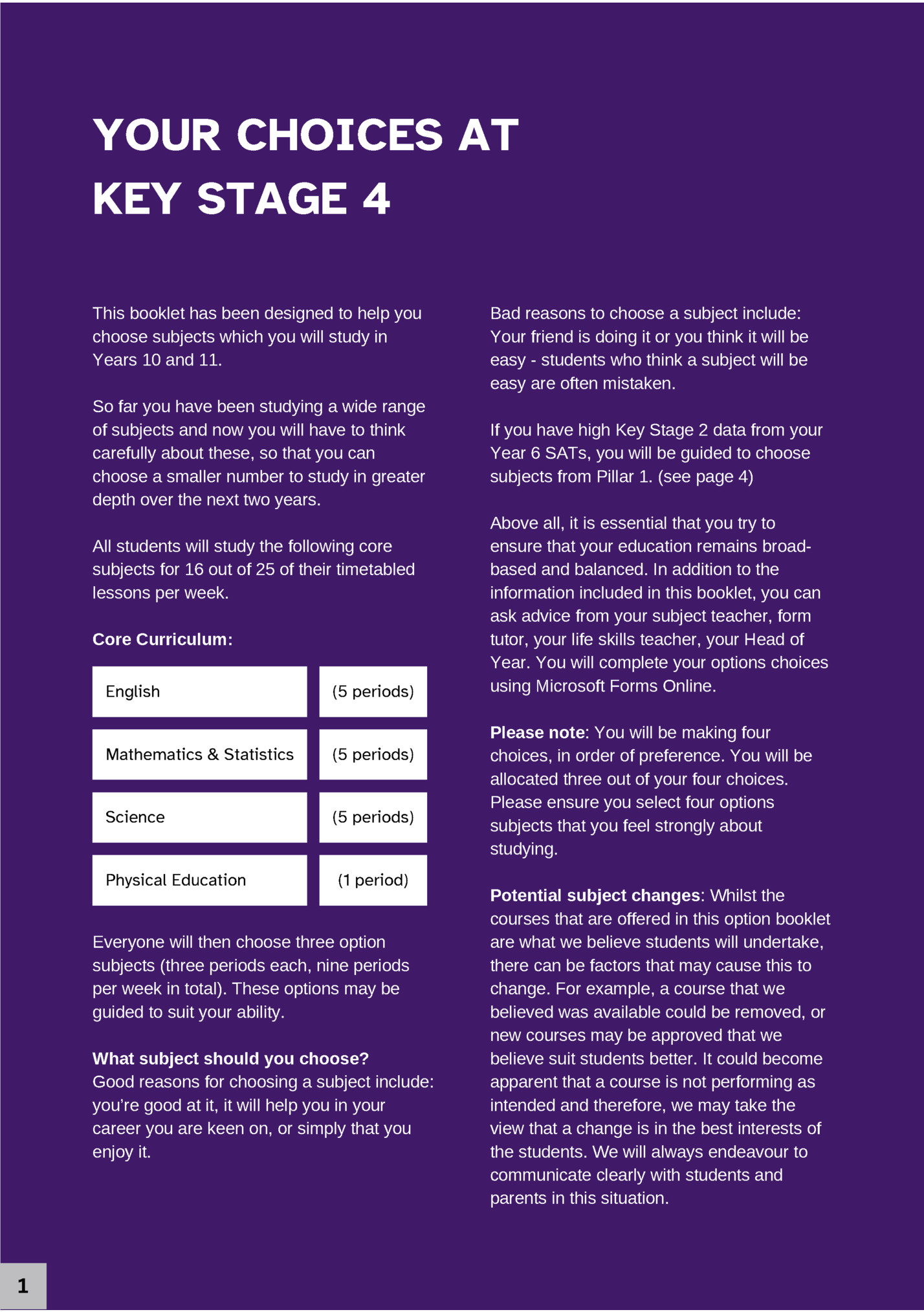
QUALIFICATION FAQS What is a BTEC? BTEC stands for the Business and Technology Education Council. BTECs are specialist work-related qualifications available in a range of sectors. They combine practical learning with subject and theory content. The BTECs that we offer at Key Stage 4 are equivalent to 1 GCSE and offer the equivalent levels of rigour and challenge to a GCSE. BTECs also have clear progression routes and career pathways beyond Key Stage 4. What is a Cambridge National (CNAT)? Cambridge Nationals are equivalent in the size to GCSEs and are available in a range of subject areas. They are considered an excellent start to vocational study and enable progression to Level 3 vocational qualifications. For specific subject details see the relevant subject page later in this booklet. Both BTEC and CNAT courses follow a modular assessment process. This means, unlike GCSE courses who have one final assessment in Year 11, these courses have assessment points throughout the duration of the course. This helps students to ‘bank’ a percentage of their qualification at different milestone points over the two-year course, rather than one singular exam in Year 11. These courses have recently had a structure review from Ofqual, meaning joining these courses late is not an option. 2
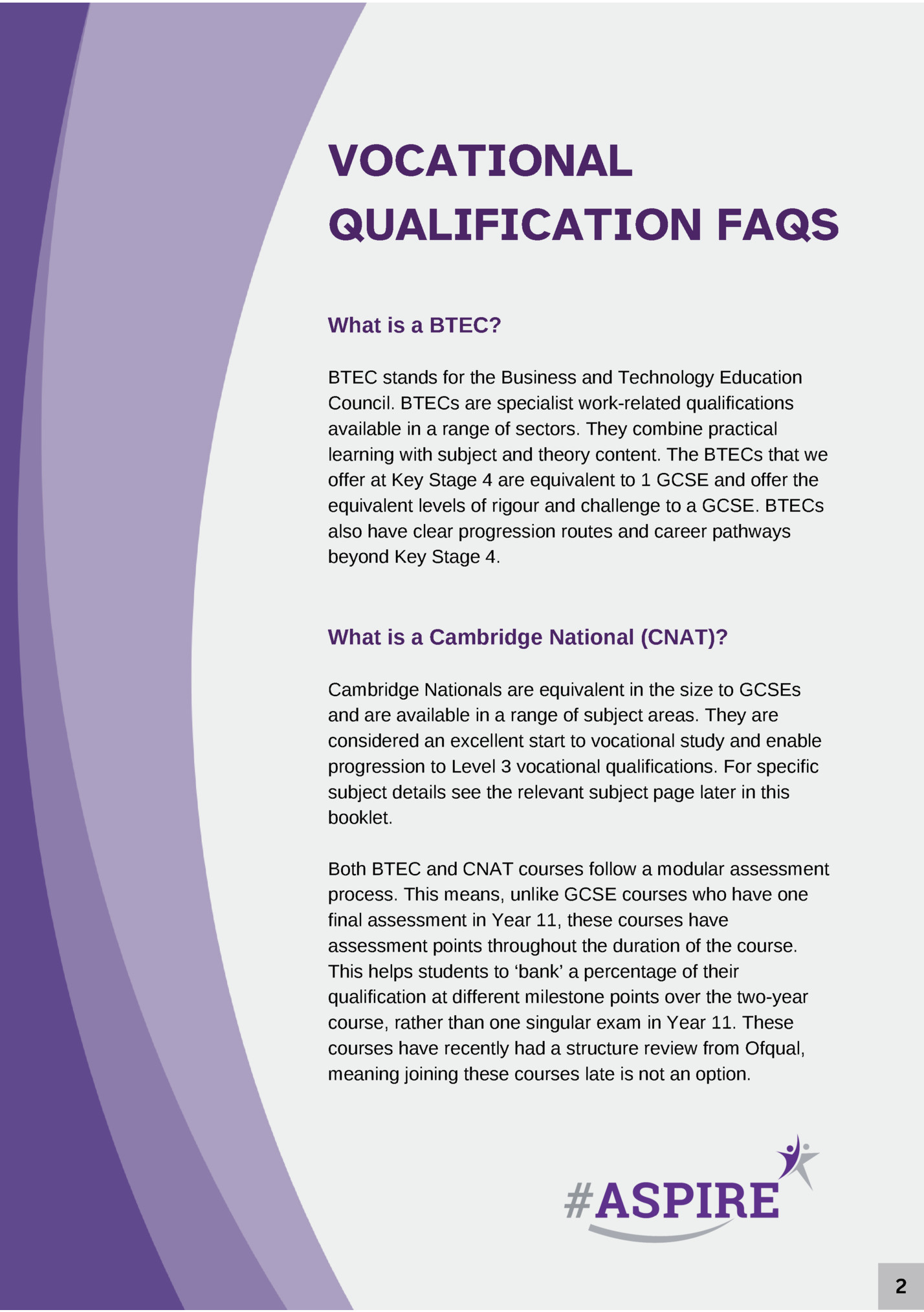
CURRICULUM MODEL CURRICULUM INTENT Aspiration providing new opportunities and experiences beyond the curriculum to inspire future career pathways Academic Excellence Social Responsibility our broad, balanced, and ambitious curriculum enables all students to flourish curriculum design nurtures tolerance and kindness, building citizens of the future Choose four subjects in total but one must be from Pillar 1. You will be allocated three of these choices. PILLAR 1 All students are exposed to further stretch and challenge knowledge opportunities To nurture confidence and resilience Supporting thier learning in Maths and English Improve social mobility PILLAR 2 Developing students social, financial, and digital understanding of the world we live in Equip students with the skills to navigate competitive employment PILLAR 3 Experiences that inspire possible future career roles Understanding the wider breadth of employment pathways Computer Science Citizenship Child Development Geography Creative iMedia Fine Art History Enterprise & Marketing Health & Social Care Modern Languages (French) Graphic Communications Hospitality & Catering Modern Languages (German) Information Technology Music Psychology Sociology Performing Arts Religious Education Sports Science Sociology Triple Science Sports Studies Although not compulsory, studying one subject from each pillar helps to triangulate the knowledge, skills and acumen to support students to become a successful active citizen of the future. 3
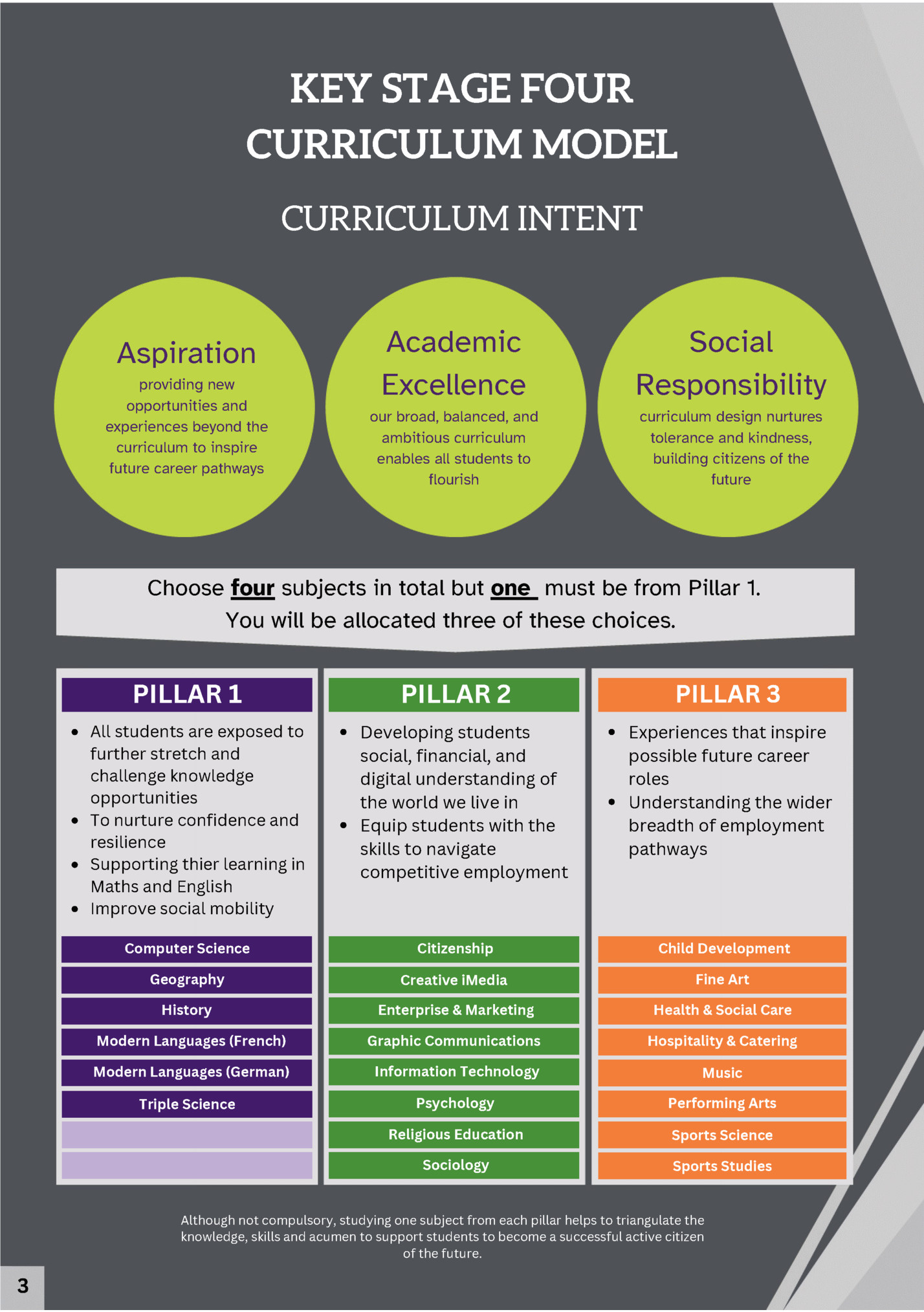
What is the English Baccalaureate (EBacc)? The EBacc is made up of the subjects which are considered essential to many degrees and open up lots of doors. Research shows that a student’s socioeconomic background impacts the subjects they choose at GCSE, and that this determines their opportunities beyond school. A study by the UCL Institute of Education shows that studying subjects included in the EBacc provides students with greater opportunities in further education and increases the likelihood that a student will stay on in full-time education. Sutton Trust research reveals that studying the EBacc can help improve a young person’s performance in English and Maths. The government’s ambition is to see 75% of students studying the EBacc subject combination at GCSE by 2024, and 90% by 2025. To attain a strong pass in the EBacc, students need to achieve a grade 5 or higher in GCSE: English Language or Literature, Mathematics Triple and/or Combined Science Geography and/or History A Modern Foreign Language 4
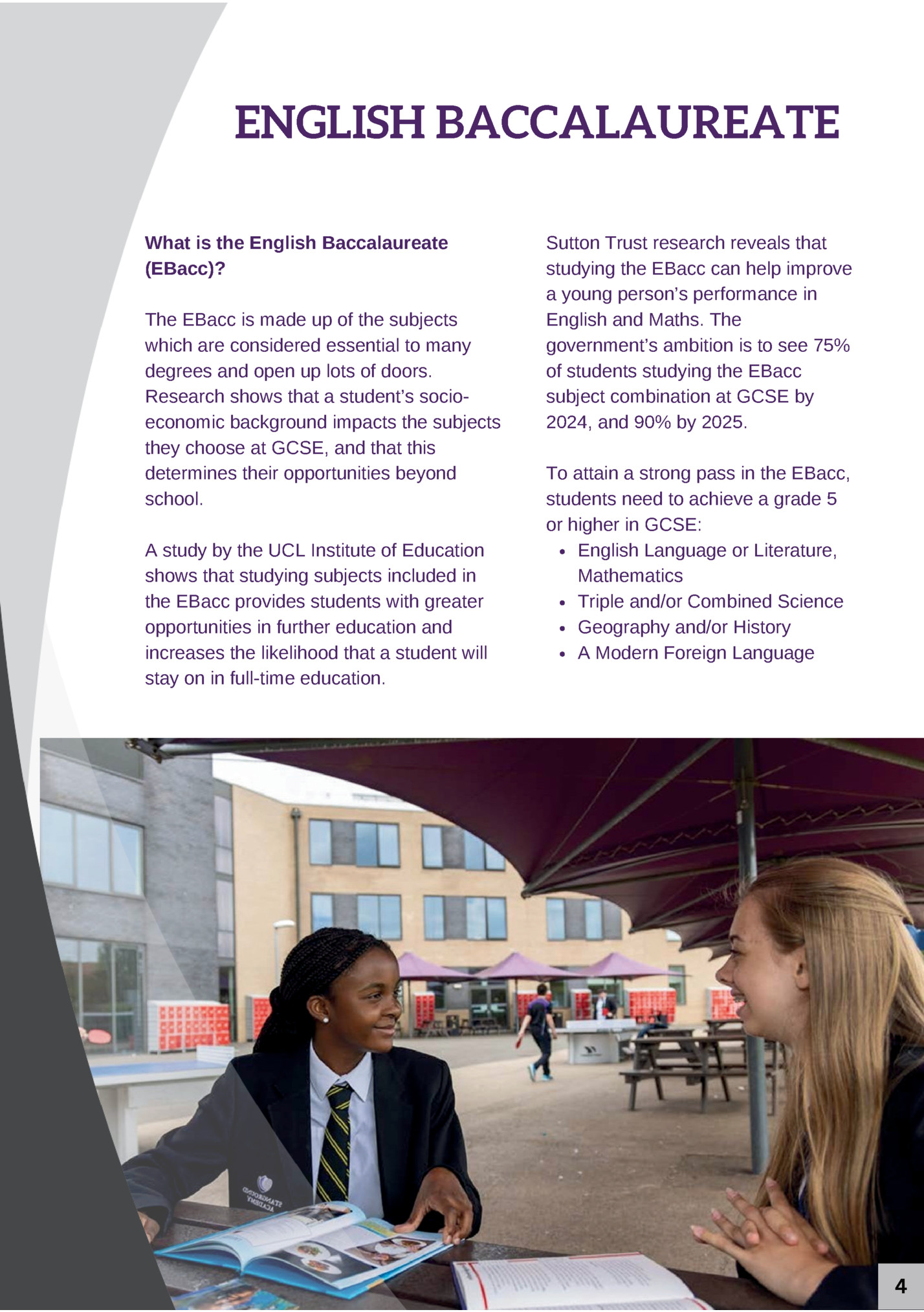
LANGUAGE & LITERATURE GCSE English The English Department offers both Language and Literature courses for the majority of GCSE students, providing you with two GCSEs at the end of the course. AQA GCSE English Language The course encourages you to enjoy and appreciate language, teaching your analytical skills and the ability to communicate accurately, appropriately, confidently and effectively. You will explore how writers influence readers and use these skills in your own writing. This course will be assessed by an examination in Year 11. AQA GCSE English Literature GCSE English Literature allows you to explore several aspects of literature through the in-depth study and wider reading genres: prose (novels or short stories); poetry; drama. 5 This course will be assessed by examination in Year 11. From your study of literature, it is hoped that you will gain the benefits of enjoying books, of being exposed to writing from difference cultures and of experiencing emotional and intellectual growth through reading about new experiences and considering different viewpoints. You will develop an appreciation of literary tradition and heritage, develop your powers of analysis and learn to make connections between texts with greater skill, confidence and independence. You will study: A play by Shakespeare A nineteenth-century novel A selection of poetry since 1789 Post 1914 friction or drama

GCSE Mathematics & Statistics Understanding mathematics is essential for future opportunities in further education and careers. Students will need to reach certain levels of competency in mathematics to take Sixth Form courses, be admitted to colleges and universities, and to have a wide range of career choices. We aim as a faculty: to provide a broad mathematical learning experience to provide the skills required to succeed in higher education and employment to promote a positive attitude to Mathematics study and an enjoyment of the subject to encourage students to carry on with mathematics post-16 where appropriate to play an active role in contributing to the cross-curricular themes of Literacy and Reading. Course Details Mathematics is a core subject in the National Curriculum and important for many jobs and careers. A good understanding of mathematics will help you with other subjects at Sixth Form. All students will need some specialist equipment for this subject. A ruler, protractor and especially a Casio Scientific Calculator are essential for all external exams and will also be required during lesson time. The course will enable you to: develop fluent knowledge, skills and understanding of mathematical methods and concepts acquire, select and apply mathematical techniques to solve problems reason mathematically, make deductions and inferences and draw conclusions comprehend, interpret and communicate mathematical information in a variety of forms appropriate to the information and context Examinations Details: OCR GCSE Mathematics There are three terminal examination papers: one non-calculator and two calculator exams. Students will sit either the higher tier (Grades 9-3) or foundation tier (Grades 5-1) papers. Edexcel GCSE Statistics Students are additionally given the opportunity to study GCSE Statistics at a Higher or Foundation level. This consists of two terminal examination papers. Both are calculator exams. 6
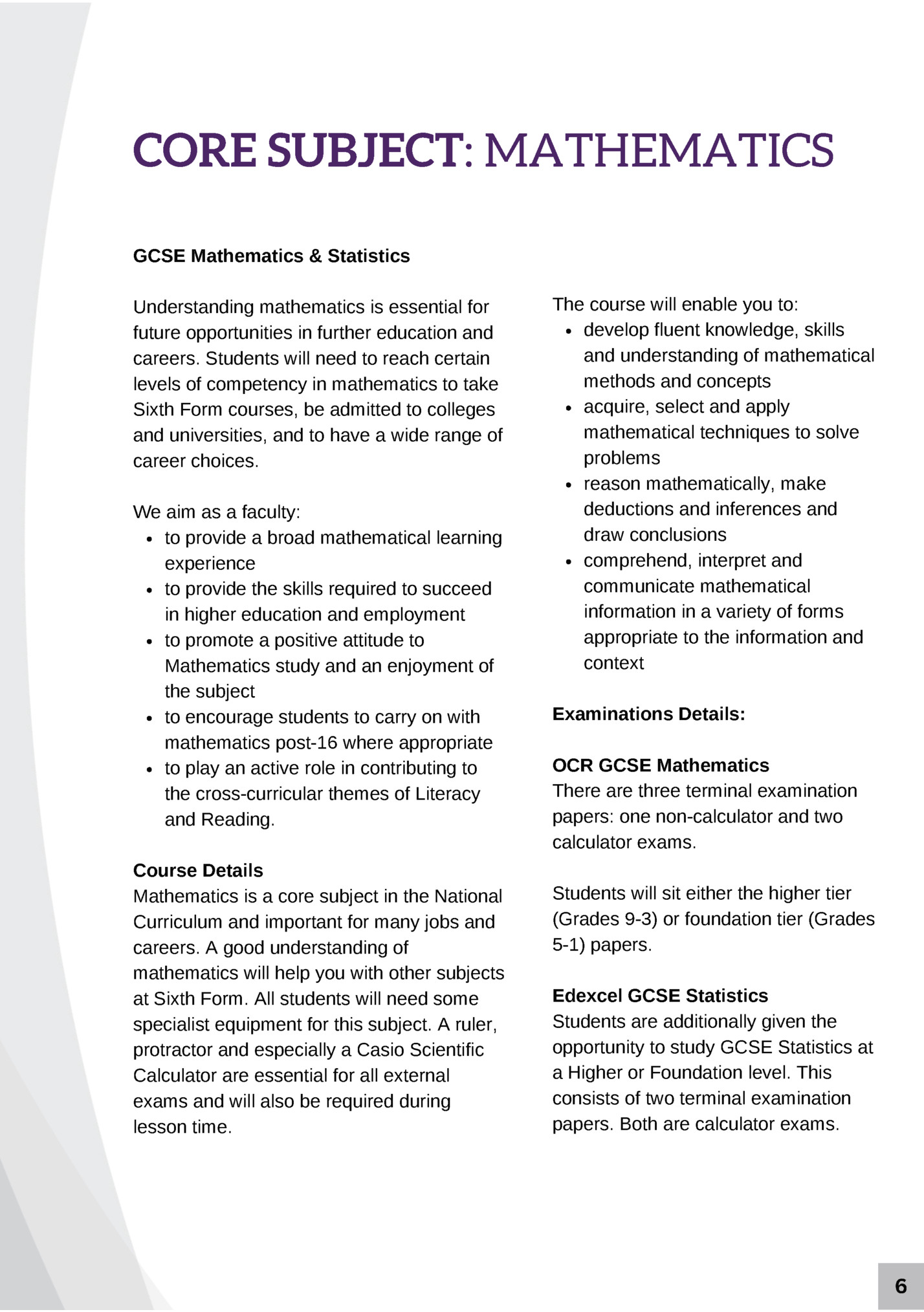
COMBINED SCIENCE AQA GCSE Combined Science Combined Science: Trilogy From deepest space to the smallest module, science affects all that we see and do. Science is full of excitement, wonder and interest which stimulates imaginative and creative thinking. This course is available to all students and aims to provide you with a challenging and stimulating study of the Sciences in a combined manner. Taking this course, you will have subject teachers over all GCSE years, who will teach Biology, Chemistry and Physics in a combined manner. Successful completion of the course will result in two sciences GCSEs that cover all three Sciences. Progression to study A-Level Sciences or related courses at the academy and at college is possible with these qualifications. Whether your plans are to follow a career in the sciences or not, there are many skills that you will learn during your studies of science that will help you throughout life. The science curriculum at Stanground Academy aims to offer you a variety of options that supports you in your destinations beyond GCSE. All students embarking on their science GCSE journey will study GCSE Combined Science Trilogy unless they opt in and are chosen to study GCSE Triple Science. 7 Combined Science: Trilogy leads to the award of two GCSE qualifications.
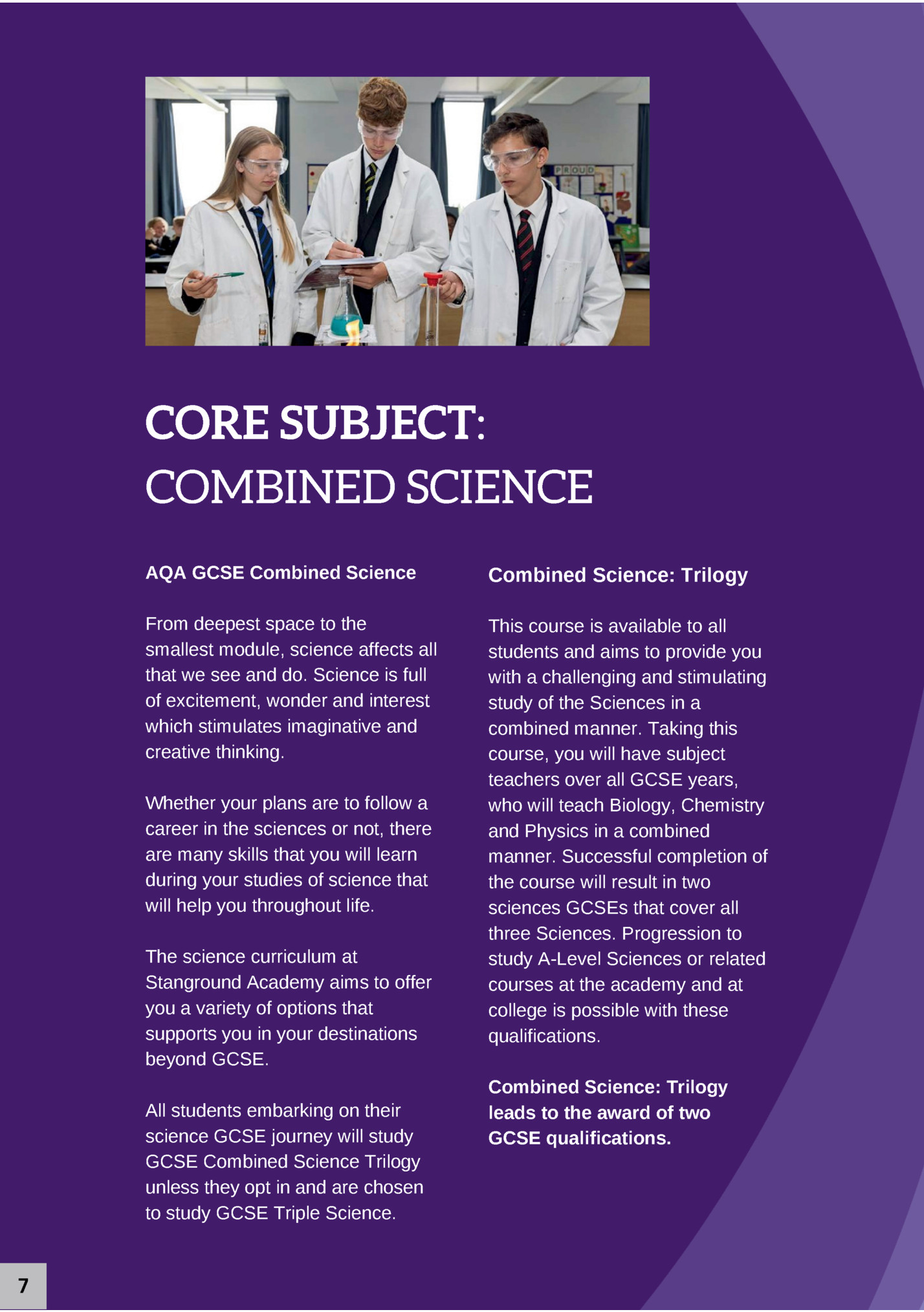
SCIENCE OCR GCSE Computer Science Computers are changing every part of our lives at an ever-increasing rate why not drive the future? If you have an interest in how computers work and enjoy programming and problem solving, Computer Science is the subject for you. Course Contents: The course is assessed through two external exams and each exam is worth 50%. GCSE Computer Science is about: How computers and computer systems work Networks, security and protocols How computers are designed, built and programmed Developing computational thinking Making use of technology for real life situations It encourages problem solving and gives knowledge and skills to understand and interact in a technological world The two exams focus on computer systems and computational thinking. Component 1: Systems architecture, networks, memory, storage and protocols. It also looks at ethical, legal, cultural and environmental concerns associated with computer science. 8 Component 2: Computational thinking, algorithms, programming techniques and data representation. Progression route: Students wishing to continue this path into Sixth Form can opt to take the Cambridge Technical Level 3 in IT which offers a variety of IT and Computer Science based units. This qualification is highly regarded by further education establishments, higher level apprenticeships and industry and commerce. To study Computer Science you will need to have a predicated Grade of a 5+ in Science and a 6+ in Mathematics. Career opportunities: Systems Engineering Robotics Cyber Security Games Development Software Development Internet & WWW Programming Analyst App Developer Entrepreneur Electronics
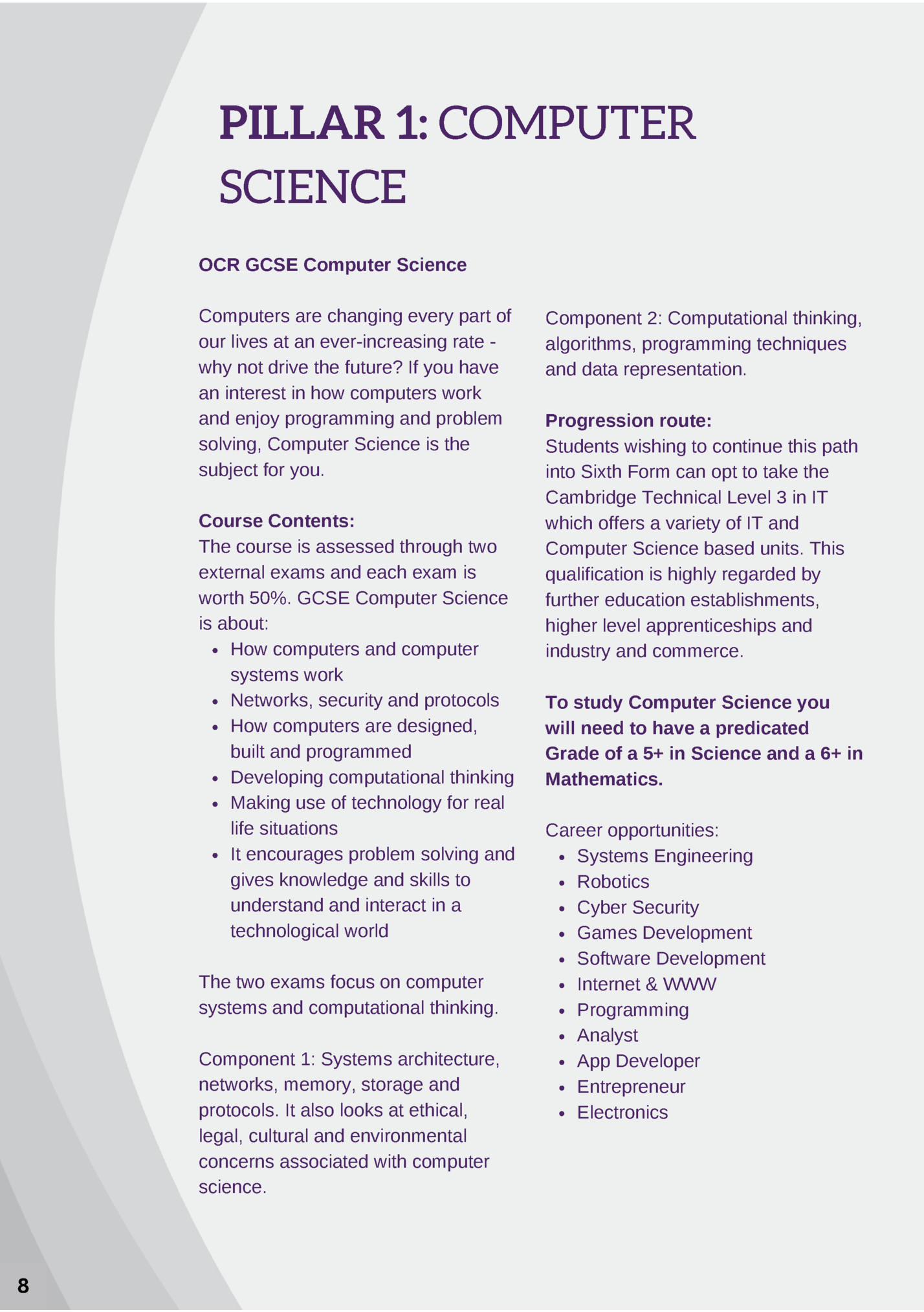
Fleepit Digital © 2021